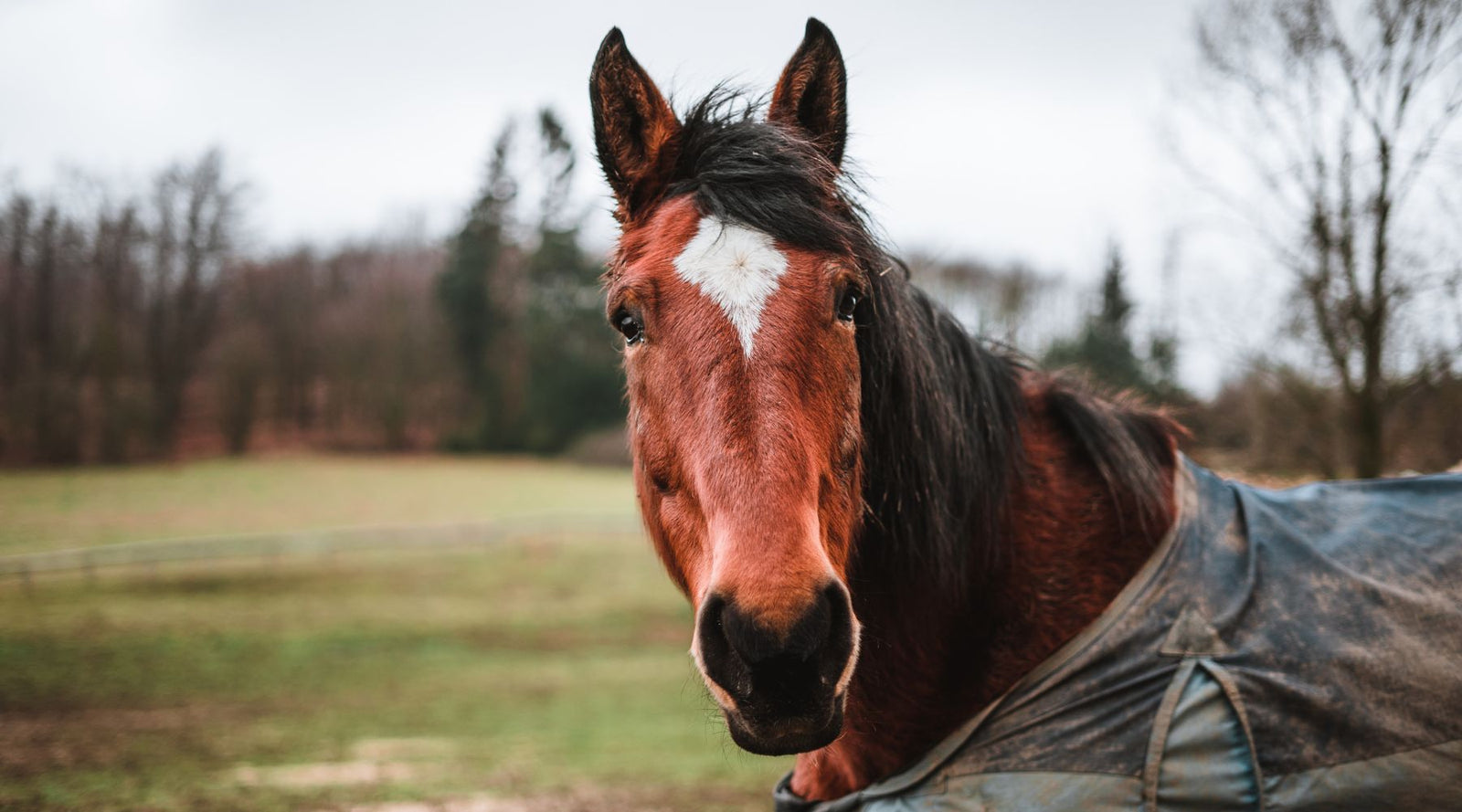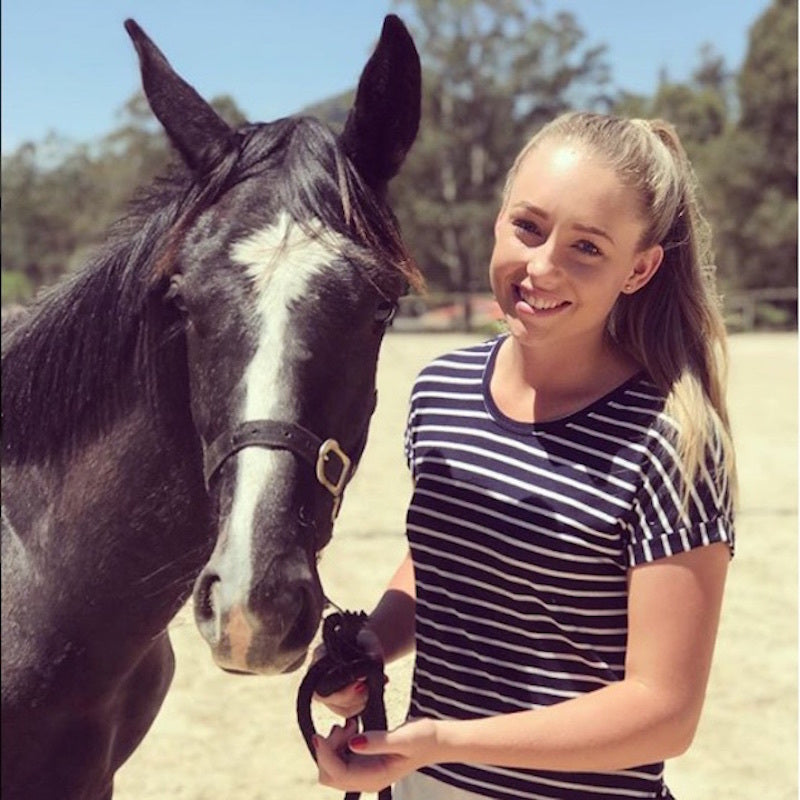Horse & Rider
Winter Horse Health – Common Ailments & How To Manage them
by Fiona Lane June 30, 2025

Cold, wet winter conditions can lead to stiffness, weight loss, weakened immunity, and hoof problems - particularly in horses that are already vulnerable due to age, workload, or pre-existing conditions. In this blog post, we’ll explore the most common winter ailments in horses, what causes them, how to spot the early signs, and natural remedies that may support recovery and resilience.
Key Highlights
- Cold, wet winter weather affects the health of horses, including immune and liver health, joint stiffness, appetite and condition, mud fever, and hoof conditions like laminitis.
- Spot early signs of common winter ailments and understand what they mean - particularly for common winter concerns such as joint inflammation, poor immunity and common hoof issues.
- Discover natural remedies for horses such as Immune Boost and Liver Plus that support immunity, gut health, liver function, joints, and more.
- Prepare ahead of time to prevent issues with proactive care, natural remedies, and vet collaboration to keep horses at their best and comfortable throughout winter, especially in older or at-risk horses.
- Find additional winter wellness tips for pets and people in our linked blogs.
Cold, wet weather can challenge your horse’s health, affecting immunity, condition, joints, and hooves. The key to keeping your horse at its best is knowing how to spot issues early and act quickly to support them back to recovery.
Why Winter Weakens Immunity
Winter places extra demands on a horse’s immune system. Fluctuating temperatures, wet conditions, and reduced access to pasture can weaken their natural defences. Horses recovering from illness, surgery, or those under stress are even more susceptible. For general immune system support during winter or all year round, try our Immune Boost Equine remedy, which is safe for long-term use and ideal for horses with impaired immune systems.
The Liver’s Role in Equine Health
The liver performs over 500 vital functions, including detoxification, nutrient processing, and protein synthesis, all of which influence immune response. When liver function is compromised, a horse’s immunity and overall vitality may decline.
Signs of poor liver function in horses
- Increased susceptibility to infections or minor illnesses
- Slower recovery from minor injuries
- Lethargy or reduced performance
- Persistent skin or respiratory issues
Supporting the immune system naturally
Ensure your horse has a diet rich in antioxidants, vitamins, and minerals, along with regular exercise and a clean, stress-free winter environment.
Natural support
- Liver Plus for horses supports healthy liver function in horses. Start dosing in autumn for best results.
- Immune Boost for horses: A year-round remedy for horses under immune stress or recovering from illness, or just in need of a pick up.
Loss of Appetite and Weight
Cold weather increases caloric demands, and if forage quality is low, horses may struggle to maintain weight. Stress can also impact appetite, especially in older horses or those with faster metabolisms.
What to look for
- Weight loss
- Dull, coarse coat
- Lethargy or lack of interest in food
- Incomplete consumption of hay or feed
Even temporary appetite loss can trigger a decline in immune function and digestive health.
Helping Your Horse Maintain Condition
A well-structured winter feeding program is essential. Ensure plenty of high-quality forage, avoid sudden changes in feed, and provide shelter from the elements.
Natural support
- Appetite Plus gently stimulates appetite in horses recovering from illness or under stress.
- Conditioning Tonic promotes nutrient uptake and gut health. Especially helpful for poor doers, older horses, and those in refeeding programs.
- A change in feed can increase the chances of a colic attack. While vet care is essential, our Colic Aid remedy can provide immediate support for horses experiencing minor pain or abdominal spasms while you wait for your vet to arrive.
- Changing feed can also upset their digestion, especially if there wasn’t a gradual transition – our Gastric Tonic can help with this.
Joint Stiffness and Inflammation
Cold temperatures can reduce circulation and elasticity in joints and soft tissue, especially in older or active horses. Muddy or frozen paddocks can limit movement, compounding the issue.
Signs your horse has stiff joints
A horse experiencing joint stiffness may:
- Seem reluctant to move, especially in the mornings
- Take longer to warm up during exercise
- Hesitate on certain canter leads or favour one rein
- Struggle to get up after lying down
- Show heat or swelling in affected joints
Stiffness can also result in changes in behaviour, with some horses becoming irritable or vocal when asked to work.
Supporting Recovery and Comfort
Warmth and consistent, gentle exercise are vital. Avoid overexertion, but don’t let your horse become sedentary. A regular farrier schedule also helps prevent uneven weight distribution that can stress joints.
Natural support
- Joints Plus for horses is professionally formulated to promote a normal immune response in joints showing signs of stiffness or soreness.
- Explore additional support for older horses in our Senior Horse Care collection.
Mud Fever (Greasy Heel) and Rain Scald
Causes and Risks
Prolonged exposure to wet, muddy conditions can cause the skin to soften and break, allowing bacteria to enter. This leads to inflammation, scabbing, and sometimes painful lesions, commonly known as mud fever or greasy heel and rain scald.
What to Look For
- Scabs or crusting on the pasterns, heels or body
- Swelling and heat in affected areas
- Discomfort or lameness
- Hair loss
- Discharge
Preventive and Supportive Care
Keep them clean and dry, avoid aggressive scrubbing, and manage mud exposure as much as possible.
Natural support
- Mud & Rain for horses can be used as a preventative in horses prone to Mud Fever/Greasy Heel and Rain Scald, and to support animals once symptoms emerge.
- Read our guide to preventing and managing Mud Fever or take a look at before and after photos from customers who have used our Mud & Rain remedy.
Hoof Cracks, Chips, and Infections
Wet, muddy conditions soften hoof walls and soles, making them prone to cracks that invite bacterial infection.
Symptoms of poor hoof health
- Cracks or splits in the hoof wall
- Sensitivity or heat in the hoof
- Reluctance to bear weight
- Discharge or odour indicating infection
Keeping Hooves Healthy
Regular farrier visits, clean, dry standing areas, and proper nutrition are the best first-line defences. If your horse is already on a good diet but still has hoof problems, the issue may lie with absorption.
Natural support
- Healthy Hooves supports gut health to improve uptake of the minerals that promote hoof strength. Also beneficial for horses dealing with chronic hoof infections.
For more tips, see our blog: 7 Common Hoof Conditions & How To Manage Them
Laminitis Prevention
While often associated with spring grass, laminitis can occur any time of year, particularly after dietary changes, grain gorging, or metabolic stress. Horses prone to EMS (Equine Metabolic Syndrome) or Cushing’s Disease need year-round monitoring.
Early Signs
- Increased digital pulse in the hoof
- Shifting weight between feet
- Reluctance to move or turn
- Tenderness when walking on hard ground
Proactive Management
Maintain a consistent, low-starch diet and manage access to lush pasture. Monitor weight carefully and avoid sudden feed changes.
Natural support
- LamiPrev for horses supports a normal immune response and may help reduce the severity of laminitis episodes. We also make a remedy to support horses during a Laminitis attack.
Winter Wellness for Pets and People
Don’t forget the rest of the family! We also offer winter remedies for pets and people:
- Pets: we offer formulations for cats, dogs and small pets to support immune system health, reduced mobility, issues with condition or the emergence of long term health conditions associated with ageing.
- People: we also make remedies for people! Take a look at our remedies for immune or vaccination support, fatigue or minor joint pain and inflammation.
Explore more in our Pet Winter Wellness and Winter Remedies for People blogs.
Final Thoughts
Winter doesn’t have to be a time of decline for your horse’s health. With the right support, a bit of planning, and a focus on natural remedies that work alongside vet care, you can keep your horse comfortable, well-conditioned, and ready for the months ahead.
General Disclaimer: Always follow dosing instructions. Our remedies are formulated to support the natural immune system of horses, pets, livestock, and people. We do not claim to treat, medicate, or cure any health conditions. If you are worried an animal may be in pain or suffering, please contact your veterinarian.




